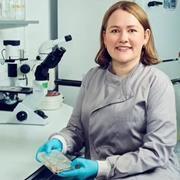Abstract
Human pluripotent stem cells (PSCs) provide a unique entry to study species-specific aspects of human disorders such as Alzheimer's disease (AD). However, in vitro culture of neurons deprives them of their natural environment. Here we transplanted human PSC-derived cortical neuronal precursors into the brain of a murine AD model. Human neurons differentiate and integrate into the brain, express 3R/4R Tau splice forms, show abnormal phosphorylation and conformational Tau changes, and undergo neurodegeneration. Remarkably, cell death was dissociated from tangle formation in this natural 3D model of AD. Using genome-wide expression analysis, we observed upregulation of genes involved in myelination and downregulation of genes related to memory and cognition, synaptic transmission, and neuron projection. This novel chimeric model for AD displays human-specific pathological features and allows the analysis of different genetic backgrounds and mutations during the course of the disease.
PMID:28238547 | DOI:S0896-6273(17)30058-2
UK DRI Authors


